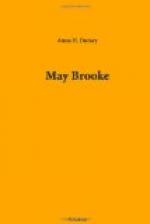“And you will be as rich as Croesus!” said Mr. Fielding, with a delighted look.
“Oh, sir! Oh, Mr. Fielding, what shall I do?” exclaimed May, bursting into a fit of crying.
“What is the matter? What in the world are you crying about?”
“I don’t want to be rich, sir; indeed, I never thought of myself. Oh, dear! I shall be so trammelled, so tempted with all this. I don’t want it, sir.”
“You are a fool. What do you want, boy?” said Mr. Fielding angrily to a boy, who was standing at the door, laughing immoderately, though in a suppressed manner.
“I have a note from Father Fabian, sir,” said the urchin, who gave him the note, and rushed out of the office, while his laughter, unsuppressed, made the street echo with its mirthful sound.
Mr. Fielding tore open the note, and read:—
“DEAR SIR: I find that it will be impossible for me to see you, as I wished to do, to-day. Ere this you have been informed, no doubt, by May Brooke of the recovery of the lost will. I can only say, with the permission of the penitent, who, through the fear of the Judgment of Almighty God, and a sincere desire for salvation, restored it; that it is the same which you drew up the day Mr. Stillinghast was taken ill; which declaration has been made to me under an oath of the most solemn character. You may, therefore, feel quite safe in making such business arrangements in connection with it as your discretion may suggest.
“Very sincerely yours,
“STEPHEN FABIAN.”
“Of course,” said the lawyer, looking hurt, “it must be a most delicate case where such secrecy is observed. But one cannot control his suspicions.”
Just then Mr. Jerrold came in. He looked so little like a man that was going to lose the bulk of a princely fortune, that Mr. Fielding was amazed—so amazed, that he could not imagine the cause of Mr. Jerrold’s laughter, who, although highly diverted at the grave lawyer’s blackened visage, endeavored in the most polite manner to suppress it.
“He doesn’t know the will is found,” thought Mr. Fielding.
“I have called, Mr. Fielding, to say that I am ready to give an account of the stewardship of Mr. Stillinghast’s property, which I have managed for the last nine months. My wife and myself are perfectly satisfied that the will now in your hand is genuine, and are too happy to see every thing restored to its equilibrium, to wish an hour’s delay in resigning all right and title to every thing except what is legally and honestly ours.”
“Give me your hand, Mr. Jerrold. I honor your sentiments, and the prompt and honorable manner with which you meet this emergency,” said honest Mr. Fielding. “Take May home, and comfort her between you all, for the poor child is breaking her heart because she is rich.”
And so it was settled. After receiving with true humility the Sacraments of the Church, Helen, so altered and changed in all her views of life and eternity, accompanied her husband to Europe. They spent the winter in Rome, where, among other converts, who made their abjuration of error and first communion at the “Gesu,” was an American gentleman named Jerrold. We may easily imagine who this Jerrold was.




